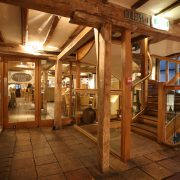Built for industry, converted for comfort
Nicholas Jacob Architects make the most of warehouse living.
Since the first New Yorkers moved into disused warehouses in its Meatpacking District, the desire for these old industrial behemoths continues to grow.
And while they might not seem the most obvious choice for a dream home, it is often precisely the history that attracts people. These old structures have stories to tell – often literally etched into their walls – along with high ceilings, huge rooms, and big windows that flood the space with light.
But developing a commercial building brings with it challenges. We can help you turn these defunct spaces into stunning homes, businesses and offices, retaining their heritage while converting them to modern homes, filled with character, warmth and comfort.
Pros and cons?
Warehouse developments are often a more sustainable option than a new build. They are enduringly fashionable, and a genuinely effective use of space in cities where it is at a premium. They are often either in the centre of town or certainly close to great transport links.
If you love open-plan living and entertaining, a warehouse conversion could be perfect for you. And while these buildings seem to offer a blank canvas, their origins also give you a jumping off point – a theme if you like – into which you can inject your own personality.
On the flip side, you are unlikely to have a private garden, be in a residential part of town and will almost certainly not occupy the whole building, so will need to get on with your neighbours. External changes will apply to the whole building so you may not get a say in that side of the development.
Converting an old warehouse can be a can of worms – often expensive and requiring updates to all sorts of essential services, particularly if they’ve been out of use for a long time. Many are now listed, adding to the expense and restricting what you can do with them.
They can be noisy, expensive to heat and to keep clean! So, a practical design, as well as a beautiful one, is crucial right from the start.
How can we help?
Whether you are hoping for a large, loft-style open apartment or a smaller flat within a building, we can help you create a home that will reflect its origins while adding all the benefits of contemporary modern design. Our expert team will help you navigate the complex maze of fire regulations, listed buildings rules and general building regulations.
Juxtaposing strong metal elements alongside wood or leather for built-in furniture such as bookcases and kitchens, as well as using softer materials for movable furnishings, is a stylish look that combines the contemporary with the heritage.
You might want to retain exposed brick walls inside, for example. High ceilings might feature metal piping and lighting, and cavernous rooms can be given shape using wooden or metal pillars. Adding colour in textures, furniture and wall hangings gives warmth to the industrial feel of the basic structure.
One of the most popular uses of the warehouse space is for work-life style, and we can design an interior that successfully combines ‘office’ areas, sleeping areas, kitchen and living areas. Flexible configurations can include always-hidden areas (such as bedrooms) along with movable partitions enabling, for example, a kitchen sometimes to be concealed and sometimes to be part of the larger living space.
We recently undertook significant restorations to an 18th century warehouse in Ipswich, disused since 2004. This Grade I & II* listed building was converted into a restaurant with private function rooms, incorporating the early 19th century former malt kiln. We designed internal joinery, staircases and cabinets and, after liaising with building control teams and the fire department, created an innovative misting system that meant we could retain the open plan layout for our client, rather than subdividing the space to meet fire regulations.
View more photos of this project
For more information on how we can help create your dream home, call us on 01473 221150 or contact us via our form here.






